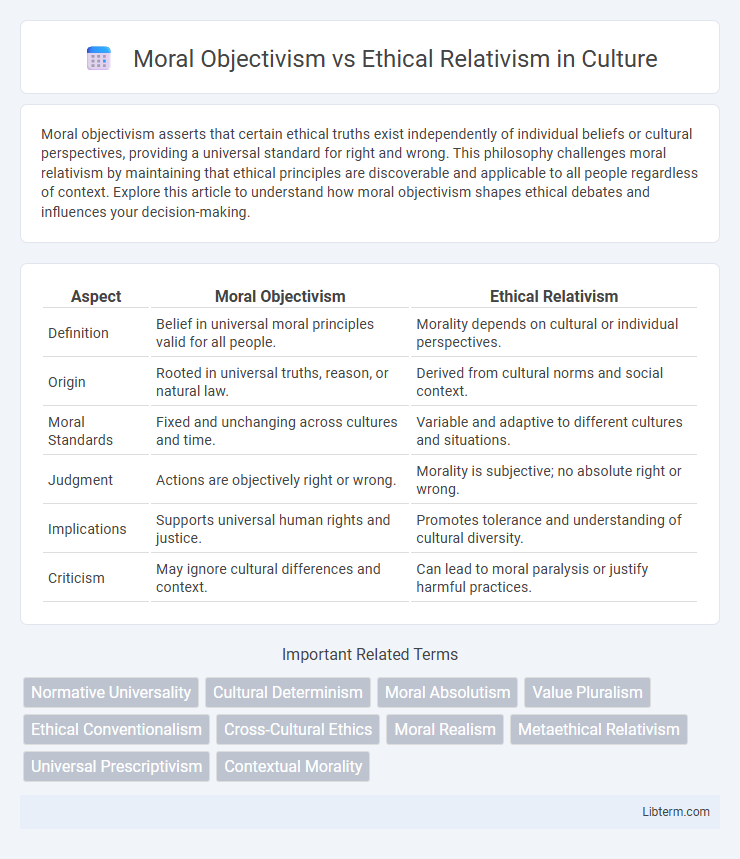Moral objectivism asserts that certain ethical truths exist independently of individual beliefs or cultural perspectives, providing a universal standard for right and wrong. This philosophy challenges moral relativism by maintaining that ethical principles are discoverable and applicable to all people regardless of context. Explore this article to understand how moral objectivism shapes ethical debates and influences your decision-making.
Table of Comparison
| Aspect | Moral Objectivism | Ethical Relativism |
|---|---|---|
| Definition | Belief in universal moral principles valid for all people. | Morality depends on cultural or individual perspectives. |
| Origin | Rooted in universal truths, reason, or natural law. | Derived from cultural norms and social context. |
| Moral Standards | Fixed and unchanging across cultures and time. | Variable and adaptive to different cultures and situations. |
| Judgment | Actions are objectively right or wrong. | Morality is subjective; no absolute right or wrong. |
| Implications | Supports universal human rights and justice. | Promotes tolerance and understanding of cultural diversity. |
| Criticism | May ignore cultural differences and context. | Can lead to moral paralysis or justify harmful practices. |
Introduction to Moral Objectivism and Ethical Relativism
Moral objectivism asserts that certain ethical principles are universally valid and independent of individual beliefs or cultural differences, grounded in objective facts about human well-being or rationality. Ethical relativism contends that moral judgments and values are culturally dependent and vary according to societal norms, rejecting universal moral standards. These contrasting perspectives shape debates in meta-ethics, influencing how morality is defined and applied across diverse contexts.
Defining Moral Objectivism
Moral Objectivism asserts that certain ethical principles are universally valid and independent of cultural or individual beliefs, grounding morality in objective facts or rational truths. It contrasts with Ethical Relativism, which holds that moral values are culturally dependent and vary across societies. This perspective supports the idea that some actions are intrinsically right or wrong regardless of societal norms or personal opinions.
Key Principles of Ethical Relativism
Ethical Relativism posits that moral standards are culturally based and therefore subject to individual societal norms rather than universal truths. Key principles include the rejection of absolute moral rules, emphasizing that concepts of right and wrong vary across different cultures and historical periods. This framework promotes tolerance and understanding by acknowledging diverse ethical perspectives without imposing one standard as superior.
Historical Background and Philosophical Roots
Moral Objectivism traces its roots to ancient Greek philosophy, notably in the works of Plato and Aristotle, who argued for universal moral truths grounded in reason and human nature. Ethical Relativism emerged prominently during the 20th century, influenced by anthropological studies and philosophers like Franz Boas and Ruth Benedict, emphasizing cultural context and the variability of moral practices across societies. The philosophical debate centers on whether morality is fixed and universal or contingent upon cultural, historical, and individual circumstances.
Major Thinkers and Theories
Moral Objectivism is championed by Immanuel Kant, who argued for universal moral laws grounded in reason, exemplified by his categorical imperative. Ethical Relativism finds support in the work of Ruth Benedict, who emphasized the cultural specificity of moral norms and the impossibility of universal ethics. These theories contrast in their approach to moral truth, with objectivists asserting absolute standards and relativists advocating for context-dependent ethical judgments.
Strengths of Moral Objectivism
Moral Objectivism provides a stable framework for universal ethical standards, ensuring consistent judgments across different cultures and societies. It supports the notion of inherent human rights and justice, reinforcing accountability and fairness. By grounding morality in objective truths, it promotes clarity and reduces moral ambiguity in ethical decision-making.
Critiques of Ethical Relativism
Ethical relativism faces critique for undermining universal moral standards, leading to potential justifications of harmful practices across cultures. Critics argue it fails to provide a consistent framework for resolving moral disputes, as moral truths vary with cultural or individual perspectives. This ambiguity challenges the possibility of objective evaluations of right and wrong, weakening moral accountability and cross-cultural ethical dialogue.
Real-World Implications and Case Studies
Moral objectivism asserts universal ethical standards applicable across cultures, influencing global human rights legislation and international law enforcement, as seen in cases like the prosecution of war crimes by the International Criminal Court. Ethical relativism emphasizes cultural context and individual societal norms, explaining variations in moral practices such as differing attitudes towards capital punishment and gender rights across countries. Real-world implications include challenges in diplomatic negotiations and cross-cultural conflict resolution, where moral objectivism may clash with ethical relativism, impacting international cooperation and policy-making.
The Debate: Universal Morality vs Cultural Context
Moral objectivism asserts that certain ethical principles are universally valid, independent of cultural differences, grounding morality in objective truths such as human rights or justice. Ethical relativism argues that moral standards are culturally contingent, emphasizing the importance of historical, social, and linguistic contexts in shaping what is considered right or wrong. This debate centers on whether morality is a fixed, absolute framework or a dynamic, context-dependent construct influenced by diverse cultural values.
Conclusion: Navigating Moral Disagreements
Moral objectivism asserts universal ethical truths applicable across cultures, providing a stable framework for resolving moral conflicts by appealing to objective standards. Ethical relativism emphasizes context-specific judgments shaped by cultural norms, promoting tolerance but complicating cross-cultural moral evaluations. Navigating moral disagreements requires balancing respect for diverse values with commitment to foundational principles that foster dialogue and mutual understanding.
Moral Objectivism Infographic

 libterm.com
libterm.com